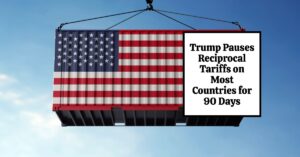President Trump's tariffs on imported goods sparked global stock market turmoil, but here's the surprising part: they could actually benefit the luxury real estate market. Investors, seeking safe havens during economic uncertainty, might shift from stocks to high-end properties, viewing real estate as a more stable and tangible asset.
Imagine waking up, checking your portfolio, and seeing a sea of red arrows. It's enough to make anyone nervous, especially if a significant chunk of your wealth is tied to the stock market. That's the scenario many high-net-worth individuals faced recently, and it's exactly why tariffs could shake up the luxury real estate market. Let's dive into why this is happening and what it means for both buyers and sellers.
Tariffs Will Likely Boost Luxury Real Estate Market in Uncertain Times
Stock Market Jitters Fueling Real Estate Interest
According to Realtor.com, the stock market has been volatile since Trump's tariffs came into play. As of April 6, the S&P 500 had already taken a significant dip. The fear of economic instability is real, and when investors get spooked, they look for a safe place to park their money.
That's where luxury real estate comes in.
- Tangible Asset: Unlike stocks, real estate is something you can see, touch, and live in. This tangibility offers a sense of security.
- Stable Pricing: While real estate values can fluctuate, they generally don't experience the same wild swings as the stock market.
- Safe Haven: In uncertain times, luxury real estate is often perceived as a safe haven for capital.
Realtor.com® Chief Economist Danielle Hale perfectly sums this up in her 2025 Luxury Housing Market Outlook: “In an economic environment riddled with uncertainty, investors are seeking out safe havens… While real estate can lose value, it is a tangible asset that not only provides shelter, it tends to have more stable pricing than stocks.”
How Tariffs Factor Into The Equation
Tariffs are essentially taxes on imported goods. The idea is to make domestically produced goods more attractive to consumers. However, tariffs can also lead to higher prices for consumers, trade wars with other countries, and overall economic instability.
Trump initially paused most new tariffs for 90 days, with the exception of China, on whom he increased the tariffs to 125%. As Hale notes, these policies can change rapidly. If tariffs are fully implemented as announced, it could hurt economic growth, reduce incomes, and diminish homebuyers' purchasing power.
Here's a breakdown of the potential impact of tariffs on the luxury real estate market:
| Scenario | Impact on Luxury Real Estate |
|---|---|
| Stock Market Volatility | Increased interest in luxury real estate as a safe haven |
| Full Tariff Implementation | Reduced economic growth, potentially impacting affordability and demand |
| Prolonged Economic Uncertainty | Continued interest in luxury real estate as a stable investment, potentially driving up prices in desirable locations |
Luxury Real Estate: An Undervalued Asset?
Here's another interesting point raised by Realtor.com: Real estate may be undervalued within the portfolios of the wealthiest Americans.
In 2024, real estate accounted for only 18.7% of total assets among the wealthiest 10% of U.S. households. This is actually down from almost 20% two years prior. Meanwhile, corporate equities, including futures and mutual funds, made up over a third of their assets – the highest share ever recorded.
This suggests that there's plenty of room for growth in the high-end housing market, especially if wealthy individuals decide to rebalance their portfolios in favor of real estate.
The Appeal to International Investors
It's not just domestic investors who are eyeing the U.S. luxury real estate market. There are indications of renewed interest from affluent Russians, who have reportedly resumed buying high-end properties in New York City. The reason? The U.S. market continues to be highly desirable for its quality of construction and other lifestyle amenities.
Is Luxury Real Estate Bulletproof?
While luxury real estate may seem like a safe bet, it's essential to remember that it's not without its challenges.
- Property Taxes and Insurance: These ongoing costs can be substantial, especially for high-end properties.
- Maintenance and Upkeep: Owning a luxury home comes with a significant responsibility to keep it in top condition.
- Market Fluctuations: While generally more stable than stocks, real estate values can still decline.
It is best to assess your risk tolerance and have a long-term mindset when making any real estate investment.
What The Data Shows About Today's Luxury Market
Data from the National Association of Realtors® supports the idea that the luxury market is thriving. Homes priced above $1 million have been the fastest-growing sales share for 21 consecutive months, now making up 7.6% of recent home sales.
This trend is likely driven by the fact that affluent homebuyers often have existing equity and don't rely as heavily on mortgage financing. This means they're less affected by fluctuations in interest rates.
Interestingly, the number of for-sale homes priced above $1 million has decreased slightly, suggesting that demand may be outpacing supply in some areas.
Other Key Market Trends:
- Time on market for high-end listings decreased from 76 to 75 days.
- Price cuts below $1 million increased, while luxury remained roughly flat.
My Takeaway
In my opinion, while tariffs and economic uncertainty can create short-term market fluctuations, the long-term outlook for luxury real estate remains positive. The demand for high-end properties is strong, driven by both domestic and international investors seeking a safe and tangible asset.
However, it's crucial to stay informed about economic developments and to carefully consider the costs and risks associated with owning luxury real estate.
What Should You Do Next?
If you're considering buying or selling luxury real estate, here are my recommendations:
- Stay Informed: Keep up-to-date on the latest economic news and market trends.
- Work with a Professional: Partner with an experienced real estate agent who specializes in the luxury market.
- Do Your Due Diligence: Thoroughly research the property and the local market before making any decisions.
- Consult a Financial Advisor: Get professional advice on how real estate fits into your overall financial plan.
Work With Norada – Invest Wisely Amid Tariff Uncertainty
As questions swirl around whether tariffs will boost the luxury real estate market, one thing is clear — stability and cash flow are key in uncertain times.
Norada’s turnkey rental properties provide passive income and long-term value—ideal for investors seeking resilience beyond high-end volatility.
Speak with our expert investment counselors (No Obligation):
(800) 611-3060
Read More:
- S&P 500 Plunges 6% in Biggest Fall Since 2020 Amid Trade War Fears
- Stock Market Predictions 2025: Will the Bull Run Continue?
- S&P 500 Plunges by 2% as Inflation Panic Grips Markets
- Stock Market Crash: Nasdaq 100 Tanks 3.5% Amid AI Concerns
- Stock Market Crash Prediction With Huge Discounts on Bitcoin, Gold, Houses
- S&P 500 Forecast for the Next Year: What to Expect in 2025?
- Stock Market Predictions for the Next 5 Years
- Billionaire Warns of Stock Market Crash If Harris Wins Elections
- Stock Market is Predicted to Surge Regardless of the Election Outcome
- Echoes of 1987: Is Today’s Stock Market Crash Leading to a Recession?
- Is the Bull Market Over? What History Says About the Stock Market Crash
- Wall Street Bear Predicts a Historic Stock Market Crash Like 1929
- Economist Predicts Stock Market Crash Worse Than 2008 Crisis
- Stock Market Forecast Next 6 Months
- Next Stock Market Crash Prediction: Is a Crash Coming Soon?
- Stock Market Crash: 30% Correction Predicted by Top Forecaster



